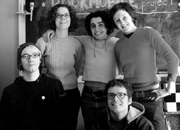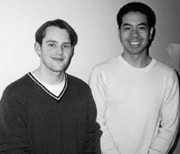 |
 |
|
|

Bookmobile
organizers
|
Two projects by Concordia students have been nominated for awards by Forces
Avenir, a non-profit organization that encourages contributions to the
community by Quebec university students. Grants totalling $115,000 and
internships in far-flung countries will be awarded to the winners at a
gala on Oct. 10.
Bookmobile is activist art in motion
by Jay Poulton
Since 2001, Project Mobilivre and its dedicated group of volunteers
(pictured at right) have travelled across the United States and Canada
in their vintage Silver Airstream trailer, promoting and displaying the
works of artists, activists, and writers to a variety of communities.
Project Mobilivre travels with a selection of books in three basic categories,
said Leila Pourtavaf, a member of the Mobilivre team. “We have artists’
books that challenge the concept of a book. We also have zines [magazines],
which vary widely in content and style, and independent publications that
are put out by small publishers.”
The books vary in content, but are tied together by the idea of expression
free from the constraints of larger publishing companies that would not
usually print activist books and newsletters.
“The books we display are not things you will find at Chapters. We
had an older woman complain about some books being too sexual in nature,
but she spent almost two hours looking at them.”
Pourtavaf said the group works with community centres, libraries, schools,
and gives workshops to give visitors hands-on experience in creating book
art and zines. The project travels with a library of about 400 works,
changing each year.
They offer the communities they visit a diverse selection of works that
they would not normally find in mainstream media. This dedication to promoting
a free exchange of ideas has lead to Project Mobilivre being named as
a Forces Avenir finalist. A grant from Forces Avenir would be welcome,
because Mobilivre must rely on donations from private and public sponsors.
“Funding is always an issue,” Pourtavaf said. “Basically,
we have no funding. A lot of the donations come from people who visit
the exhibit. Last year our van broke down and we had to cancel the tour.
This year, because of fundraising, we have a better van.”
Despite the occasional technical problem, the response has been very positive.
“Some cities are better than others. It depends on the promotions
that we get, because we set up with the community groups before going
into each city so people already know about us and where we will be.”
The Project Mobilivre trailer is currently touring in the United States,
but will be arriving in Montreal at the Concordia campuses on Oct. 15
and 16.
|
|
|

Ron
Scott and Allan Rosales
|
Internship
led to work with depressed youth
by Nora Gombos
Group
Creative Arts Therapies was created by two Concordia students to help depressed
adolescents, and their outstanding work has not gone unnoticed.
Ron Scott, 25, and Allan Rosales, 28, have been selected as two of the finalists
for the Health Avenir Award, and the winners will be announced at the 4th
edition of the Forces Avenir Gala, which will be held on Oct. 10 at the
Bonsecours Market in Old Montreal. “We are honoured,” Rosales
said.
Their project was an independent endeavour, but they say they couldn’t
have done it without the supervision and support of Dr. Brian Greenfield,
at the Montreal Children’s Hospital, where the project was carried
out, and Bonnie Harnden, a professor in the Creative Arts Therapies Program
at Concordia.
Scott and Rosales started their project last October during their internship
at the Montreal Children’s Hospital, when they worked with depressed
adolescents aged 14 to 17 at risk of suicide. The young people were referred
to the project by Dr. Greenfield.
“We spend the first few sessions assessing their disorder and individual
issues,” Scott explained, “and then use the modalities of art
and drama as a jumping-off point for them to gain insight and to begin the
healing process.”
Applying the principles of art therapy treatment, they “did everything,”
according to Rosales. “We painted, we drew, we made collages and even
sculptures. Each young person was special, and as a result, his or her preference
for making art was different.”
Both students believe in the beneficial effects of creative arts therapy
as a psychotherapeutic treatment. As it doesn’t rely on verbal communication,
it enables patients to express individual issues and feelings they are reluctant
to talk about, or unable to put into words. Used in a group setting, it
also allows them to see the “universality of their predicament”
by witnessing other young people facing the same challenges, according to
Scott.
Despite the growing literature demonstrating the positive outcomes of creative
arts therapy, it is not yet a widespread form of treatment. Concordia is
currently the only university in Canada that offers a master’s-level
program. By combining a strong clinical component with artistic disciplines,
Concordia has earned one of the best reputations in North America for its
research in this field.
Because depression is one of the most prevalent disorders in adolescence,
Scott and Rosales hope to do more work in the field. They want to take it
to schools and mental health facilities, and if possible, conduct workshops,
to reach a wider range of people.
“Certainly, any money received in the Forces Avenir competition would
go towards those ends,” Rosales said.
|



